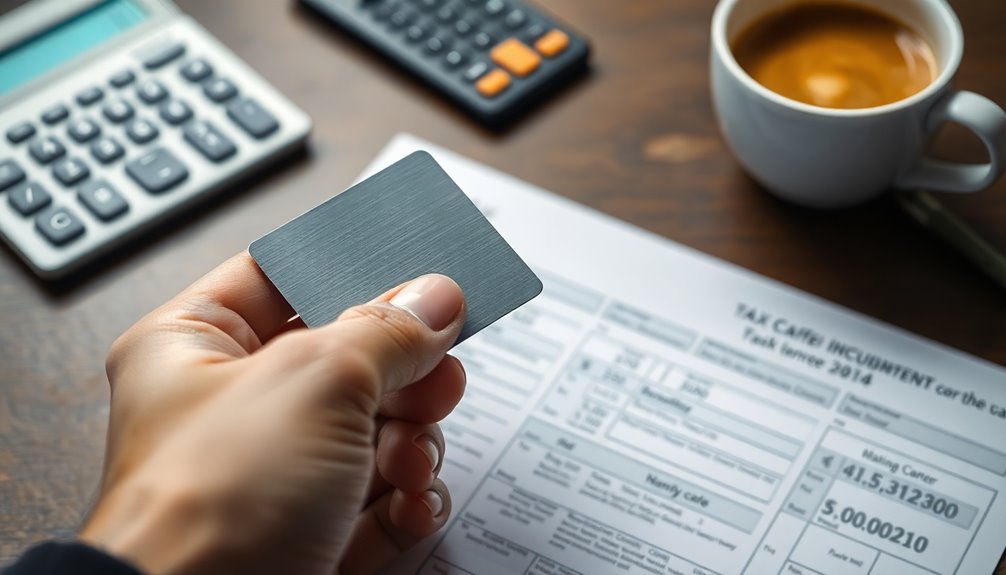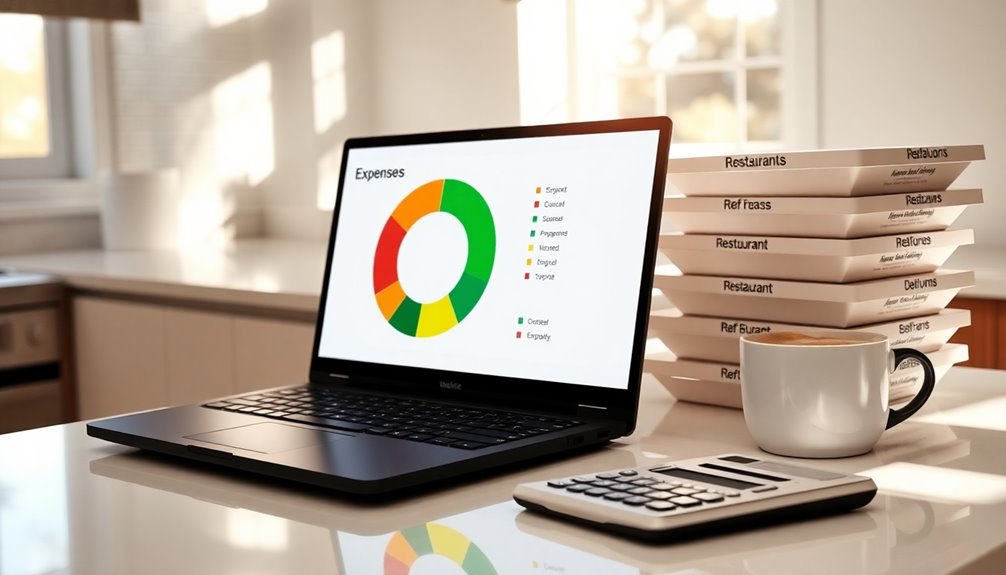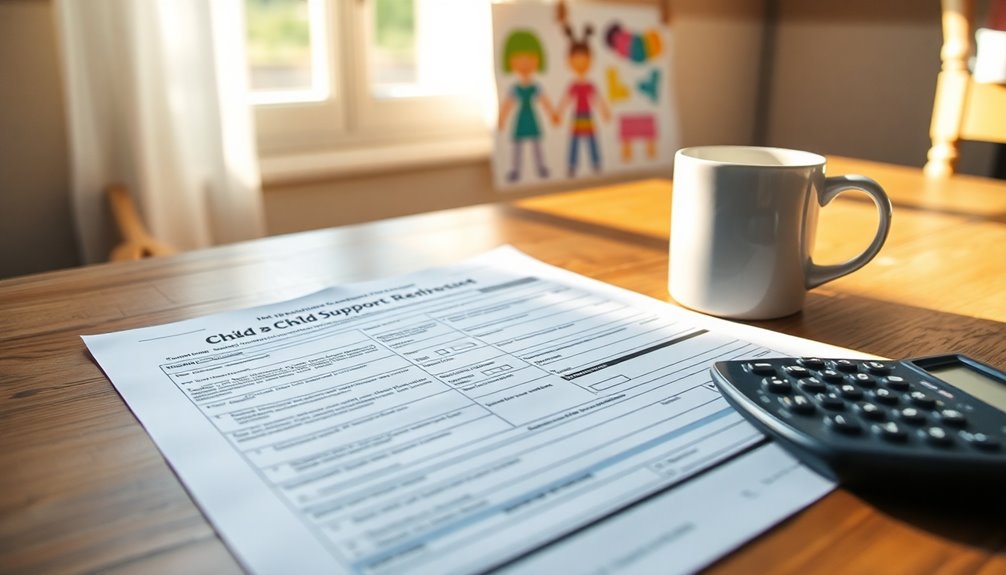Yes, you can pay your taxes with a credit card. The IRS allows it through authorized payment processors, but check your state and local rules first, as acceptance varies. Be aware of the fees, typically ranging from 1.85% to 1.98% of your payment. Also, not all credit cards earn rewards for tax payments, so check your card's terms. Remember, paying via credit card won't boost your credit score directly, and high utilization can hurt it. If you want to know more about how to navigate this process effectively, keep exploring the details!
Key Takeaways
- Federal income tax payments can be made with a credit card through authorized processors, while state tax acceptance varies by location.
- Major credit cards like Visa, American Express, Discover, and MasterCard are typically accepted for tax payments.
- Processing fees for credit card tax payments usually range from 1.85% to 1.98%, plus minimum fees.
- Rewards credit cards can earn cash back or points, but evaluate if rewards outweigh processing fees.
- Tax payments via credit card do not boost credit scores, and high utilization may negatively impact your credit rating.
Eligibility for Credit Card Payments
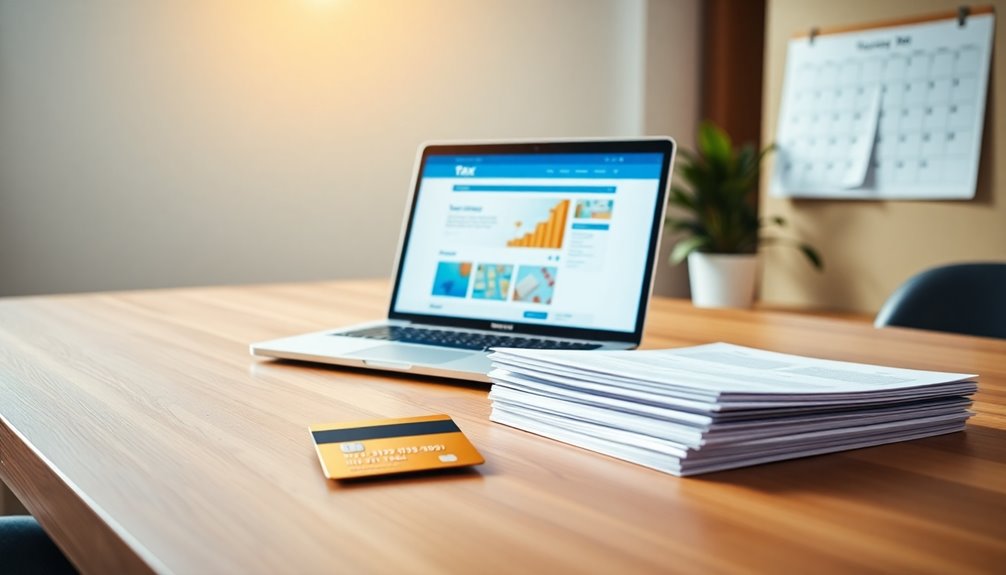
When it comes to paying your taxes with a credit card, eligibility can vary based on several factors. You can pay federal income tax using a credit card, which is universally accepted through authorized processors.
For state income tax, though, it depends on where you live; some states allow credit card payments while others may not. Property taxes also have specific guidelines, and in certain locations, you can use a credit card.
You'll find that most major credit cards—like Visa, American Express, Discover, and MasterCard—are eligible, including those offering rewards. If you have cards with promotional 0% APR periods, you can leverage those for interest-free payments. Business credit cards are also an option.
However, it's essential to check with your local jurisdiction to confirm what types of taxes are eligible for credit card payments. The IRS doesn't directly accept credit cards but authorizes third-party processors to handle these transactions. Additionally, the IRS limits the frequency of credit card payments each tax year, so plan accordingly to maximize your rewards.
Payment Processors and Associated Fees
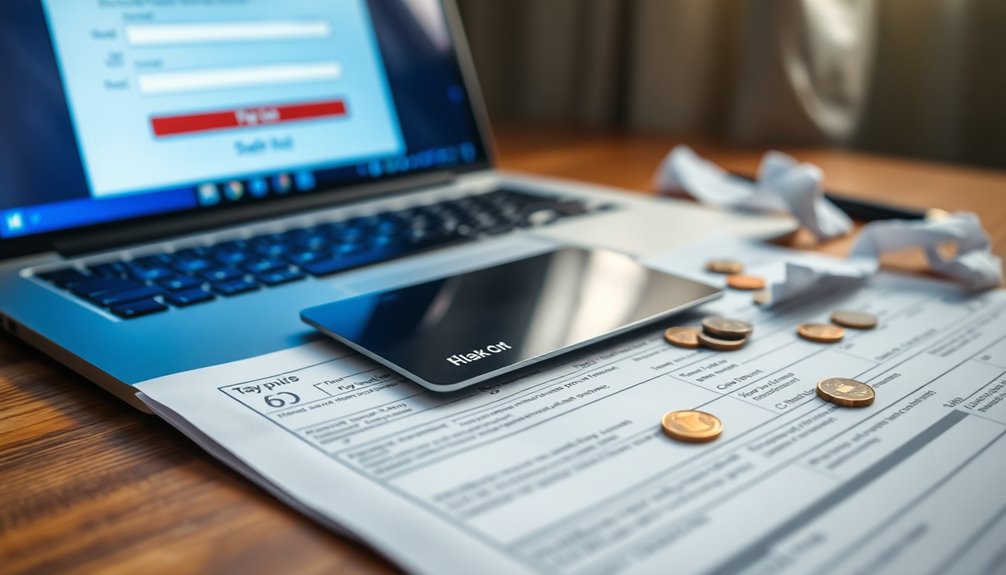
Although the IRS doesn't directly accept credit or debit card payments, it authorizes independent payment processors to handle these transactions. Some of the approved processors include ACI Payments, Inc., Pay1040, and payUSAtax.
These companies charge fees for processing your payments, which you'll be responsible for covering. The fees vary among processors, typically ranging from 1.85% to 1.98% of your total bill, or a minimum fee, whichever is higher. To streamline the payment process, the IRS is proposing to eliminate third-party payment processors for card transactions, allowing taxpayers to pay directly with their credit or debit cards.
For example, if your tax bill is $5,000, you might face fees between $93.50 and $99. Each processor has its minimum fees: $2.50 for ACI Payments and Pay1040, and $2.69 for payUSAtax.
If you use tax software like TurboTax, be aware that it may charge even higher fees, around 2.49% for credit card payments.
It's essential to check the IRS website for a complete list of authorized payment processors before making your payment. Remember, you're responsible for these processing fees, as the IRS doesn't cover them.
Understanding these costs can help you make informed decisions about how to pay your taxes.
Effects on Credit Score

Paying your taxes with a credit card can have implications for your credit score, even though tax payments themselves aren't reported to credit bureaus.
While your on-time tax payments won't boost your credit score, how you manage the credit card used for this payment can make a difference. If you open a new credit card for tax payments, expect a hard inquiry on your credit report, which might temporarily lower your score.
Additionally, using a significant portion of your credit limit for tax payments can increase your credit utilization ratio, also negatively impacting your score. If you don't pay off the balance in full, you might face interest charges and fees that can add to your overall debt. Understanding credit score implications is essential before borrowing, as credit scores can influence eligibility for loans or credit cards.
On the flip side, making timely payments on that credit card can help improve your credit score over time.
However, if tax debt leads to unpaid balances and potentially tax liens, the long-term repercussions can affect your creditworthiness.
Rewards and Benefits of Payment

Using a credit card to pay taxes can unlock a variety of rewards and benefits that make the expense more manageable. When you use a rewards credit card, you can earn cash back, points, or miles, helping to offset processing fees. If your rewards value exceeds the fees, you'll actually save money. Some cards offer 2% cash back or travel credits, which are great if you pay your balance in full.
Additionally, paying taxes can help you meet the minimum spending requirements for new credit card welcome bonuses, which can be worth hundreds or even thousands of points or cash back. By making separate payments with multiple cards, you can maximize earnings from different bonuses.
If you opt for a card with a 0% APR promotional rate, you can finance your tax bill interest-free for several months. This gives you extra time to pay off your debt without incurring high interest rates, which is especially helpful for large tax payments. Furthermore, using a credit card allows you to take advantage of potential tax-deductible fees, which can further reduce your effective costs.
Lastly, using a credit card ensures timely payment, helping you avoid late penalties from the IRS, which can save you money and reduce stress.
Importance of Financial Discipline
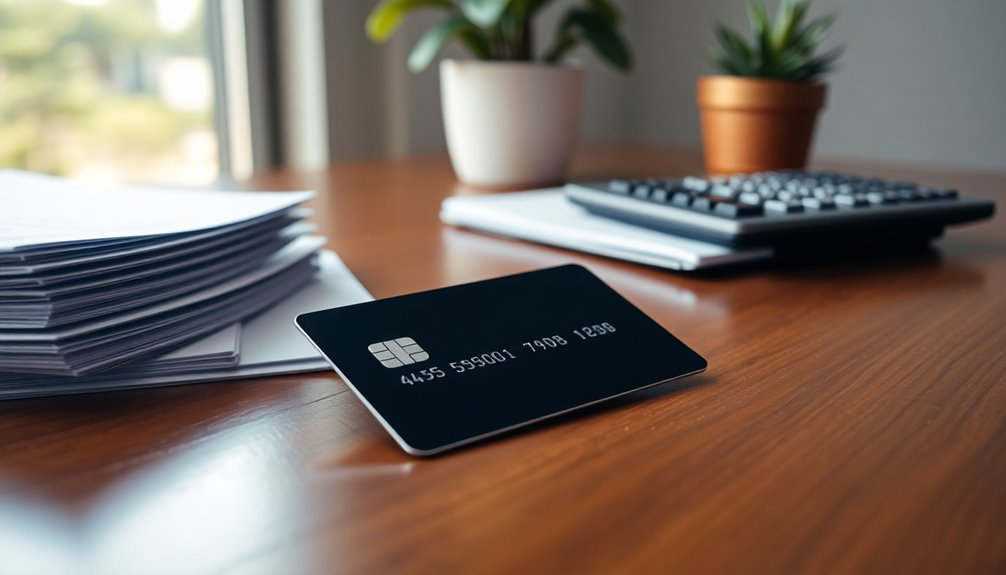
Mastering financial discipline is essential for achieving long-term financial success. It starts with effective budgeting and expense management. By adhering to a detailed budget, you can track every expense, preventing impulsive purchases and prioritizing savings over fleeting deals. This ensures your funds are allocated efficiently to meet both immediate and long-term goals while avoiding lifestyle inflation as your salary increases. Additionally, financial discipline promotes regular savings and consistent investments, crucial for long-term security. Allocating a portion of your income to an emergency fund provides stability, while contributing to retirement accounts secures your future. Staying informed through financial seminars can also guide your decision-making. Moreover, understanding ounces to gallons conversions can help you manage your household expenses more effectively.
In terms of debt management, financial discipline helps you manage debt wisely, facilitating systematic repayment and improving your credit score through timely payments. This reduces the risk of defaults and helps you avoid the significant hurdle of credit card debt.
Ultimately, financial discipline enhances your future planning. It prepares you for financial crises, cultivates wealth, and fosters stability. By practicing financial discipline, you'll not only support your personal growth but also contribute to broader economic stability.
Additional Considerations and Limitations

When considering paying taxes with a credit card, it's essential to weigh the associated fees and potential rewards carefully.
You'll encounter a minimum fee ranging from $2.20 to $2.69, alongside percentage-based fees between 1.85% and 1.99% of your total tax bill. For instance, a $5,000 tax bill could lead to fees between $93.50 and $99, significantly diminishing any rewards you might earn.
If you're using a cash-back card offering 2% or less, the math mightn't favor you. On a $10,000 tax bill, you'd earn about $200 in rewards, but the fees could be nearly the same. Additionally, IRS payments are processed through independent companies that charge varying fees, so it's important to shop around for the best option.
It's crucial to verify if your card qualifies for better rewards since tax payments may not always fit into specific categories.
Moreover, ensure your credit limit is sufficient to avoid penalties, and consider using multiple cards to capitalize on various sign-up bonuses.
Remember, interest charges can quickly outweigh rewards, so paying the full balance immediately is wise. If you opt for 0% APR offers, manage your tax debt carefully to avoid extra costs.
Always calculate the total expenses before making your final decision.
Frequently Asked Questions
Can I Earn Rewards on Tax Payments With Any Credit Card?
Yes, you can earn rewards on tax payments with many credit cards.
If your card offers cash back, points, or travel miles, you'll benefit from using it. To maximize your rewards, consider splitting your payment across multiple cards or choosing those with higher rewards rates.
Just keep in mind that service fees might reduce your overall gains, so weigh the pros and cons before making your payment decision.
Are There Limits on the Amount I Can Pay With a Credit Card?
There aren't specific limits imposed by the IRS on the amount you can charge to your credit card.
However, credit card companies do have their own transaction limits, so you need to be aware of those.
It's important to monitor your credit limit closely to avoid penalties.
What Happens if I Miss My Credit Card Payment Due Date?
If you miss your credit card payment due date, you'll likely face late fees that can add up quickly, sometimes reaching $39 for subsequent late payments.
Your interest rate may jump to a penalty APR, exceeding 30%, making it harder to pay down your balance.
Additionally, your credit score will take a hit, as late payments get reported after 30 days, potentially affecting your borrowing ability in the future.
Can I Use a Prepaid Credit Card to Pay My Taxes?
You can't use a prepaid credit card to pay your taxes.
While various credit cards are accepted through payment processors, prepaid cards aren't specifically mentioned as an option.
If you're looking to pay your taxes, consider traditional credit or debit cards, which come with fees that can affect your overall payment.
Alternatively, you can opt for direct pay from your bank account, which doesn't incur any fees.
Always check the latest guidelines before proceeding.
How Does Paying Taxes With a Credit Card Affect My Tax Return?
Paying taxes with a credit card can affect your tax return in several ways.
You'll face processing fees that mightn't be deductible unless you're paying business taxes. Additionally, large payments could raise your credit utilization ratio, potentially hurting your credit score.
If you settle any credit card debt, it may also result in taxable income.
Keep track of all transactions and documentation to ensure accurate reporting come tax time.
Conclusion
In conclusion, paying your taxes with a credit card can be convenient, but it's important to weigh the pros and cons. While you might earn rewards and enjoy the flexibility of payments, keep in mind the potential fees and impact on your credit score. Make sure you're financially disciplined to avoid falling into debt. Always consider your options carefully to ensure you're making the best choice for your financial situation.
